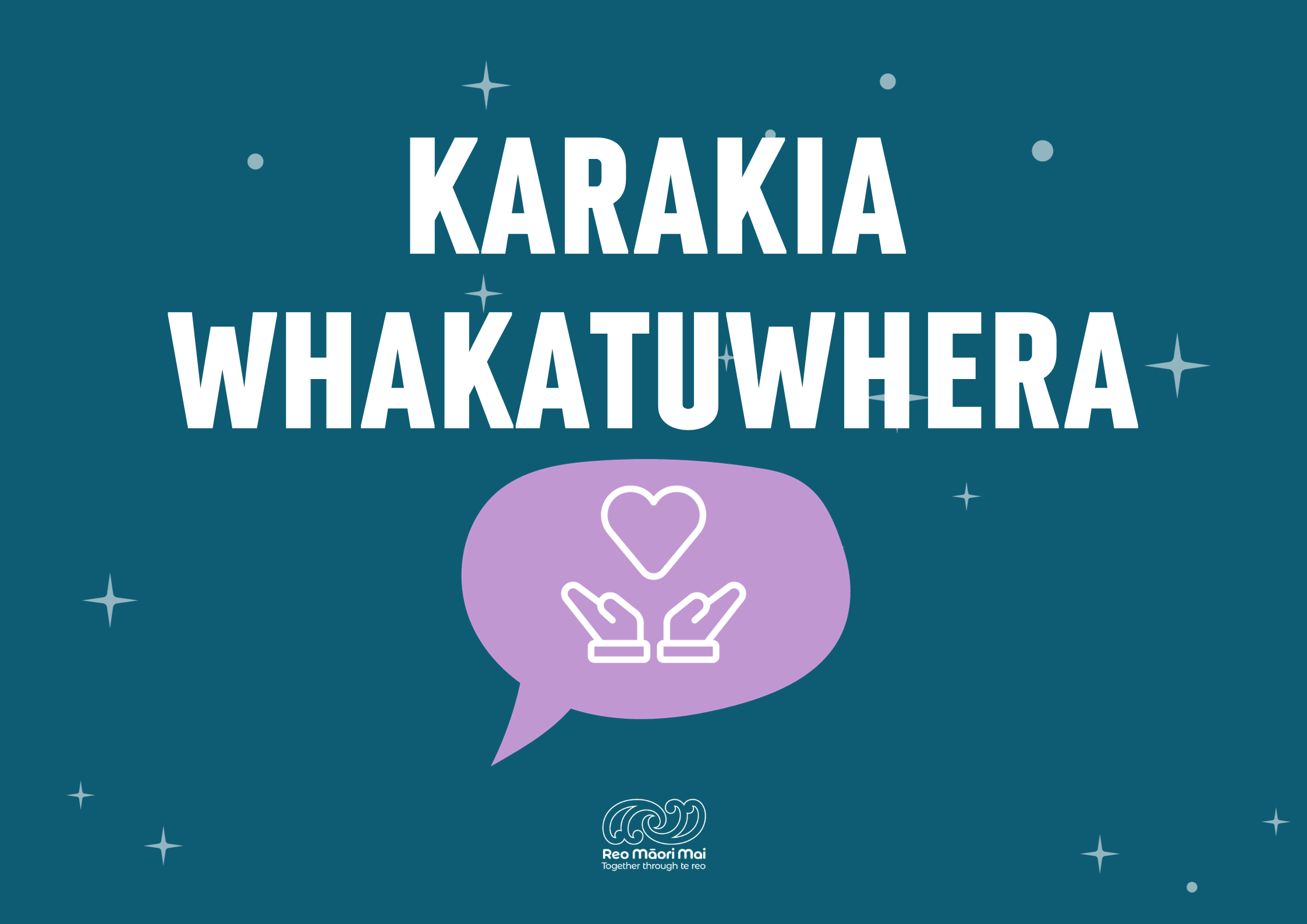- (noun) incantation, ritual chant, chant, intoned incantation, a set form of words to state or make effective a ritual activity. Not to be mistaken for ‘prayer’.
- (verb) (-tia) to recite ritual chants, to chant.
It is difficult, as with many other Māori concepts and kupu (words), to adequately translate ‘karakia’ into English. As in the definition above, ‘chant’ may be the most objective translation. Karakia are used for many different purposes - some in daily, informal spaces; others in formal contexts. Karakia can be a way to set intention, to bring people together, to centre ourselves, to acknowledge something, or to move forward into daily activities.
One of the functions of karakia is that they can be used as a transition from one space or focus into another. For example, in a group setting, people may be doing a range of different things, being noisy or sitting in different areas - karakia can indicate that it is time to come together as a group, focus intention on the words of the karakia, and mark the start of a new kaupapa or time.
Karakia can be used for many different occasions, but it is important that the right karakia be used in the right context. Choose a karakia appropriate to your specific context; make sure that you understand the meaning of the kupu or the general essence of the karakia. ie don’t open a hui with a karakia for kai or bedtime, the context and karakia don’t match!
We have created some blog posts with karakia for different contexts. Click on these links to have a read and watch the kiriata (videos):
- karakia whakatuwhera / opening karakia
- karakia whakakapi / closing karakia
- karakia kai / karakia for food
All the karakia we have chosen to offer are non-religious, which we hope makes them accessible to as many people as possible.
Karakia and inoi
At Reo Māori Mai we differentiate between karakia and inoi. We use the term inoi to refer to prayer (often Christian) in te reo Māori, with karakia being used where the kupu (words) are referring to general concepts, atua Māori, te taiao and other non-religious content.
We acknowledge that for some people karakia and inoi are one and the same, so we cannot guarantee that this distinction will be accepted and/or used by all. However we strongly recommend that where karakia are requested in non-religious spaces, that non-religious karakia are what is offered and that if religious inoi are offered that this is done so transparently to ensure all present are allowed to participate as appropriate within their own belief systems.
Waiata and Hīmene
You may hear karakia being supported with a waiata sung afterward. In this context, it is also important to make the distinction between hīmene and waiata.
Waiata is a general kupu (word) for song, or to sing. Hīmene are hymns (songs of Christian worship) translated into or composed in te reo Māori.
If you are going to choose a waiata, we suggest you choose a waiata or hīmene which is relevant for the context: eg if an inoi is said, it may be best paired with a hīmene. If a karakia is said, it may be best paired with a waiata Māori.
How to begin karakia
There are a few different phrases that we can use to signal that it is time for karakia to commence, and to let everybody know which karakia we are using so they can join in (the name of the karakia is usually the first few words of it). These phrases below can be used to start non-religious karakia, and karakia which refer to atua Māori.
Ko ____ te karakia. Tākina te karakia.
_____ is the karakia. Recite the karakia.
Ko ____ te karakia. Me karakia tātou.
_____ is the karakia. Let us all karakia.
If you were doing a karakia whakakapi (closing karakia), you might say to the group: “Ko Tēnei Te Huinga te karakia. Me karakia tātou”, and then begin the karakia. You also don’t have to say the name of the karakia - you could just say “Tākina te karakia” or “Me karakia tātou” and begin the karakia.
If you are saying inoi (as explained above), then you can use the phrase:
Ko ____ te inoi. Me inoi tātou.
____ is the prayer. Let us all pray.
Depending on the context where your karakia is occurring, you may like to briefly share the purpose and overall meaning of the karakia. This keeps everyone informed and safe in the space you are creating together. Please note this does not mean you need to provide the literal translation, but we suggest you give others a general idea of the meaning and intent of your karakia.
If you have any pātai (questions) or reflections you’d like to share from reading this blog, please leave us a comment below.



